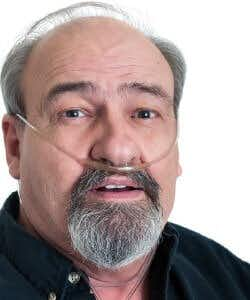
Chronic obstructive pulmonary disease (COPD) is a very serious lung condition. People with COPD often complain of a constant cough, wheezing, difficulty breathing, chest tightness, mucus and fatigue. Health professionals often blame COPD on a long history of cigarette smoking. But COPD can occur in nonsmokers. Genetics, air pollution, occupational exposure to chemicals, fumes and dust, as well as long-standing asthma can also play a role (Respirology, Aug., 2012). Treatment often involves inhaled corticosteroids such as fluticasone (Flovent) or budesonide (Pulmicort), bronchodilators like albuterol (ProAir HFA, Ventolin HFA) salmeterol (Serevent) or ipratropium (Atrovent). There is a growing controversy about some COPD drug side effects.
COPD Drugs
Because people with COPD, have a hard time breathing doctors frequently treat them with long-acting drugs to open their airways for many hours. The two mainstays of treatment are called LABAs (long-acting beta2-agonists) and LAMAs (long-acting muscarinic antagonists). The latter are anticholinergic medications.
Examples of LABAs are: arformoterol (Brovana), formoterol (Foradil) and salmeterol (Serevent). LABAs are often included with corticosteroids in combination inhalers such as Advair (salmeterol plus fluticasone), Breo Ellipta (vilanterol plus fluticasone) or Symbicort (formoterol plus budesonide).
Examples of LAMAs are: Spiriva (tiotropium), Incruse Ellipta (umeclidinium) and Tudorza Pressair (aclidinium).
COPD Drug Side Effects & Cardiovascular Complications:
Researchers have asked whether LABAs and LAMAs might pose a risk to the cardiovascular system. In 2013 an epidemiological study conducted in Canada reported that older people who had just started taking long-acting bronchodilators were at greater risk of cardiovascular emergencies (JAMA Internal Medicine, July 8, 2013).
The authors concluded that older people with COPD needed to be carefully monitored if they were prescribed LABAs or LAMAs.
New COPD Drug Side Effects:
Fast forward several years. Now another large observational study has reinforced that old concern. Epidemiologists used the national medical records of Taiwan to determine whether people were more likely to suffer a stroke, heart failure, coronary artery disease or arrhythmia when they began taking such LABAs or LAMAs.
The results, published in JAMA Internal Medicine (Jan. 2, 2018) showed that people who start a long-acting bronchodilator are 1.5 times more likely to suffer a cardiovascular complication.
Although such case-control studies cannot prove causation, the authors caution their colleagues to be very vigilant when first prescribing such medications:
“We caution physicians to closely monitor new users of LABAs or LAMAs for cardiovascular symptoms.”
Once people get past a month or longer, the cardiovascular risks seem to diminish. That’s good news. What this means, though is that both patients and physicians need to be alert for side effects that might suggest heart problems (irregular heart rhythms, heart failure or chest pain) or stroke-like symptoms.
Other COPD Drug Side Effects:
LABAs:
- Irregular heart rhythms (arrhythmias), palpitations
- Headache
- Nervousness, anxiety, tremor
- Throat irritation, pharyngitis
- Rash, itching
- High blood pressure
LAMAs:
- Dry mouth
- Symptoms of an upper respiratory tract infection, sore throat, cough
- Pain in the chest area, palpitations
- Digestive distress, stomach pain, indigestion, constipation
- Urinary tract infection, difficult urination
- Headache, dizziness, depression, difficulty sleeping
- Nose bleeds
- Glaucoma
Reports from Readers:
Reading a long list of side effects is often counterproductive. That’s because our eyes and brain glaze over after three or four symptoms. To better understand how these drugs affect people, here are some anecdotes from visitors to this website:
Elizabeth in England had problems with Spiriva:
“I took Spiriva for less than two months. It helped my breathing, but by week 7 I was overheating at night. This wasn’t a hot flush or night sweat. It was incredibly severe. It also caused frequent urination and sleeplessness, aside from the dry mouth etc. I had to stop.”
Kerry in Australia reports:
“I have COPD from welding and smoking. I was ok till I took Spiriva for 12 months. Gave it up for 5 months. Then I had a lung infection. I got antibiotics and Spiriva again.
“All of a sudden Spiriva took my breath away. I ended in emergency on morphine for pain twice. I used Atrovent and Flutiform [formoterol plus fluticasone] effectively, virtually living on augmentin and doxycyclin. I ended up in hospital with pneumonia for 8 days. They game me iv antibiotics. I came out really good for 2 weeks then lost my breath again for the last month and can’t work it out.”
L.C.J. in Texas had some scary side effects:
“In four days of use for mild COPD, I experienced significant memory loss. Day two I developed spots about two inches in diameter across my abdomen. Day three the spots felt like wood splinters and were terribly painful. I took Spiriva day four and called my pulmonologist. He told me to stop taking it.
“I read the side effects, and discovered another side effect. High Blood Pressure and heart palpations, which was the reason my cardiologist sent me to the pulmonologist along with pulmonary leak and swollen heart (left side). No one seems to be able to get my problem under control. I’m afraid of stroke or heart attack.”
You can learn more about Spiriva side effects at this link:
Spiriva (Tiotropium) Side Effects & Memory Problems
Share your own experience with COPD medication below in the comment section.

